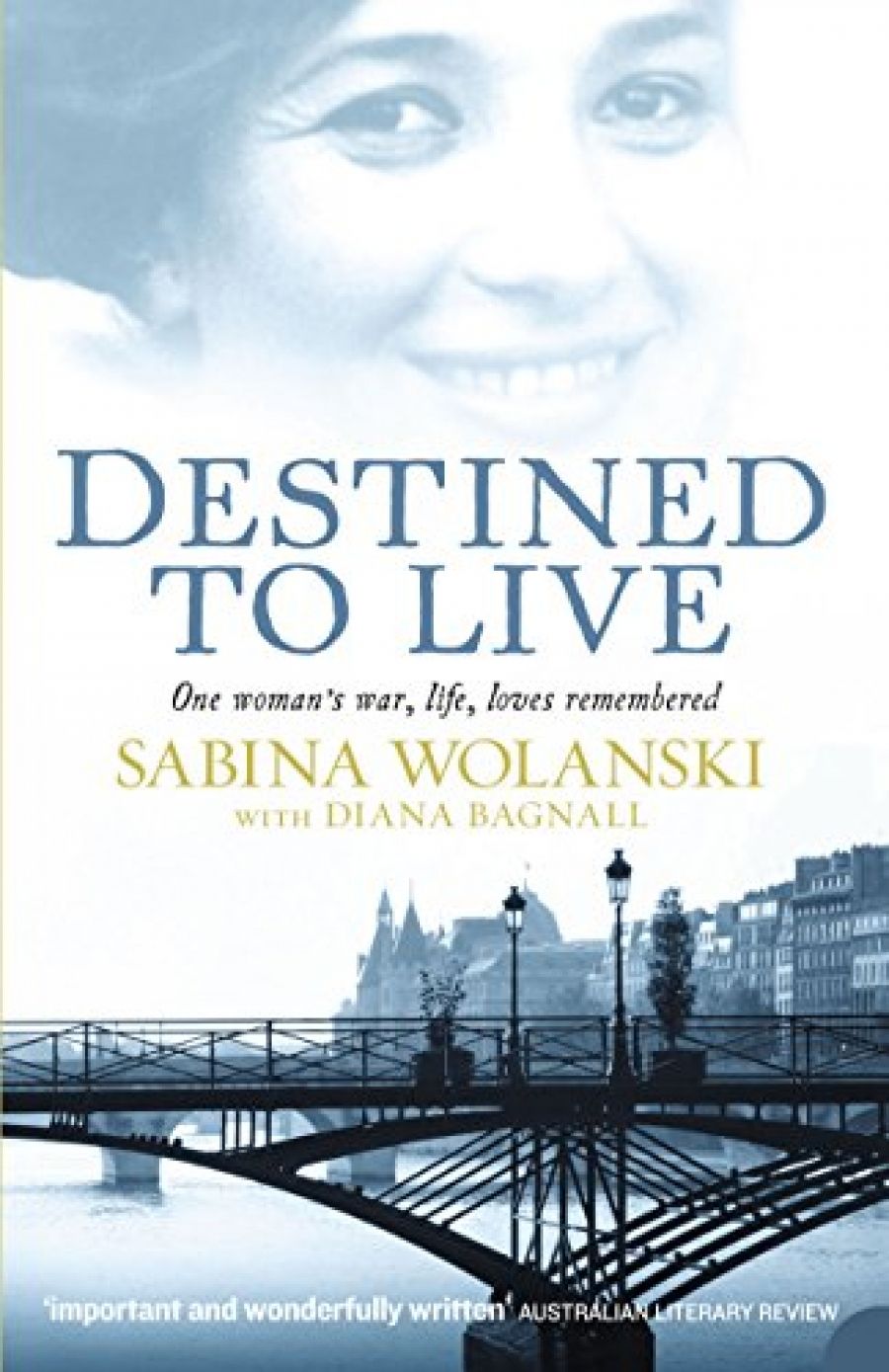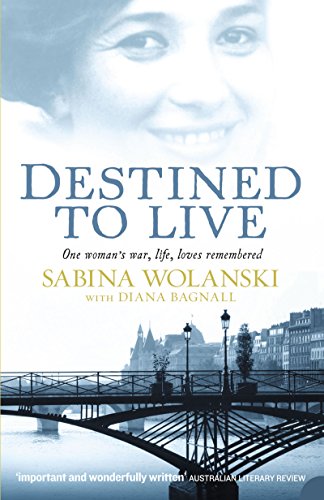
- Free Article: No
- Contents Category: Biography
- Custom Article Title: Triumph over the past
- Review Article: Yes
- Article Title: Triumph over the past
- Online Only: No
- Custom Highlight Text:
Amongst Holocaust accounts, literature and writing, there have emerged four distinctly identifiable forms: the academic historical text, exemplified by historians such as Martin Gilbert and Philip Friedman; literature, by writers such as Eli Wiesel and Primo Levi; the allegorical tale, such as Markus Zusak’s The Book Thief (2005), Karen Hesse’s The Cats in Krasinski Square (2004), and Art Spiegelman’s Maus: A Survivor’s Tale (1986); and the anecdotal account, such as this book by Sabina Wolanski, Destined to Live: One Woman’s War, Life, Loves Remembered.
- Book 1 Title: Destined to Live
- Book 1 Subtitle: One woman's war, life, loves remembered
- Book 1 Biblio: Fourth Estate, $32.99 pb, 302 pp
- Book 1 Cover Small (400 x 600):

- Book 1 Cover (800 x 1200):

Sabina Wolanski’s story is a remarkable one, a look into a woman’s desperate zest for life:
My longtime friend Roza … once sharply admonished me for ‘not understanding the difference between living life and having a good time’. I have tried to do both. My mother too was a woman with a zest for life. She was murdered, while I survived in order to live, and to live well, as she dreamed I would.
This will ‘to live well’ pervades Sabina’s colourful, successful, sexually charged, flirtatious and tenacious approach to anything life has thrown at her since she escaped the ravages of World War II and the Nazis’ obliteration of Polish Jewry.
The story is unique, too. Remarkably, Wolanski (the name of her second of four husbands, and the one she has retained) kept a series of diaries throughout her idyllic early childhood, her wartime ordeals and her subsequent life in Australia. She has since collected photographs of herself, her family and friends – both before and during the war – some of which feature in the book. Impossibly, there is even a photograph taken by, her captors, the Ukrainian militia, when they unearthed a bunker in which she was hiding with a handful of others. These historical ephemera, so rare amongst survivors, are singular in their fundamental importance, both as testament and, in the vein of Anne Frank, an honest representation of a child’s view of these terrible times.
It is a pity, then, that, in presenting and relaying these fragmented diary excerpts, Wolanski has chosen to filter them through her current recollections, and a commentary that often seeks to elaborate and to contrive segues from one to another. Looking back as she annotates her diary entries, from the point of view of an older Binka (the diminutive of Sabina), far removed in mind, soul, age and world-view from that innocent child-diarist, Wolanski robs her story of immediacy and poignant resonance.
This is compounded by repeated admissions, peppered throughout her book, that she does not remember much from these times, either because she had blocked them out long ago, or because the severity of what she experienced precluded the normality of the function of remembering. Certainly, Wolanski is at pains to present only what she can recall; hers is a not too veiled critique of Holocaust embellishment, but the means she herself has used to add context to her diaries serves only to remove and distance – an ineffectual narrative device.
The writing, too, is problematic. Wolanski is not an experienced writer, and has utilised the services of a journalist, Diana Bagnall, to tell her story. This is an honest stratagem, for it provides a factual narrative, unadorned and unembellished by any literary device. This, though, is also the book’s chief weakness; a style of writing that is flat and journalistic.
As her story progresses into the present, there are instances where Wolanski seems to rush her narrative. Loves, romantic entanglements, business ventures, all meld together with a potted history that takes in the Whitlam years, the Dismissal, the floating of the Australian dollar, and other such events. Indeed, there are chapters, especially towards the end of the book, dealing with her various marriages, where Wolanski seemingly, and frustratingly, gives the reader barely more than the dot-point treatment and insight.
That Wolanski has excelled, and at so much in life, is in itself a fulfilment of her triumph over a pained and unimaginable past. Precisely because of the unique nature of her own story, an uncluttered presentation of Wolanski’s diary entries would have been fascinating, with her subsequent story and recollections acting not as commentary but as a bookend continuation of the narrative. There is Wolanski’s appearance and testimony at the trial of the Nazi commandant who ordered the deaths of her father and beloved brother. There is her terror at having to face these horrors for the first time, in 1963, eighteen years after the war had ended. There is her unexpected meeting, at the trial, with the daughter of an SS officer, who has devoted her life to helping the victims of the Nazis – the two remain lifelong friends. And there is her speech at the dedication of a controversial Holocaust memorial in Berlin, before a gathering of dignitaries and survivors – after having suppressed much of what she had been through, for the pain alone, and the determination to move on.
Destined to Live, like all tales of human tyranny and survival, is one that needs to be told, and whose uniqueness makes it stand out. A story such as this must also be read. A more thoughtfully crafted, elegant and better-edited version of this story could have communicated so much more, so much more poignantly, to a broader audience.


Comments powered by CComment